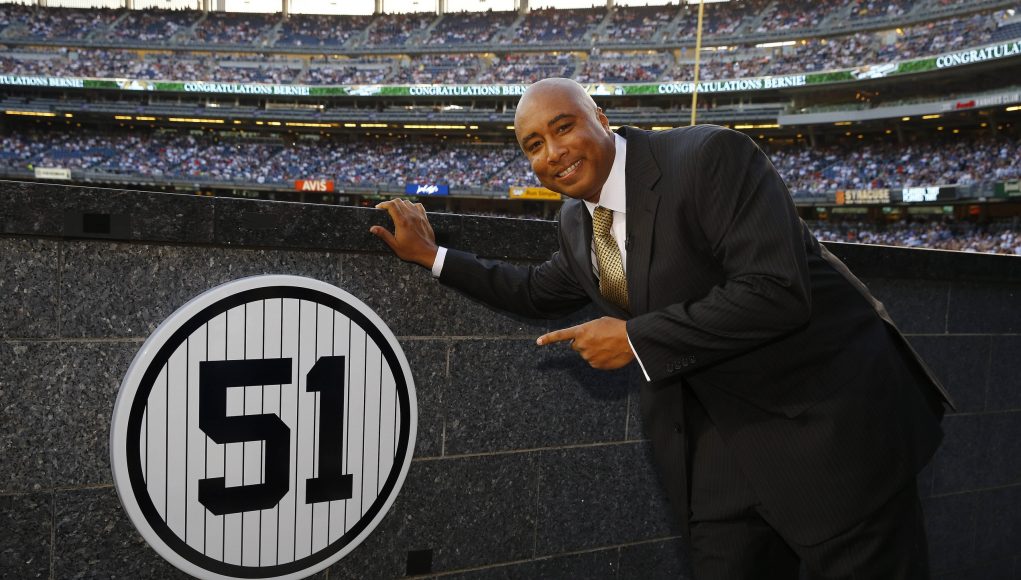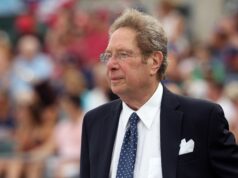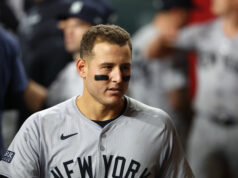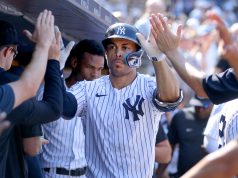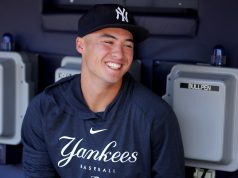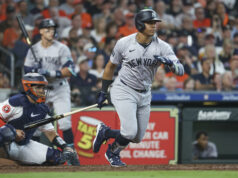The media coined the phrase “Core Four” when reporting on Derek Jeter, Mariano Rivera, Jorge Posada, and Andy Pettitte. But what about Bernie Williams?
On August 11, 1994, the New York Yankees held a 6.5 game lead over the Baltimore Orioles in the American League East, boasting the second-best record in all of baseball, just behind the now defunct and since moved to Washington club, the Montreal Expos.
Alas, Major League Baseball entered a Dark Age, and an owner-imposed strike subsequently terminated the remainder of the 1994 season, effectively canceling the World Series.
Paul O’Neill would win a batting title (a .359 batting average, along with a 1.064 OPS) in that strike-shortened season, and captain Don Mattingly would be somewhat close to his old self, albeit without the power, hitting .304 in 97 games. Wade Boggs was right behind O’Neill production-wise (.342 batting average and .922 OPS), and an up-and-coming center fielder, in what would effectively be his second full season in pinstripes, hit .289 with 12 homers and 57 RBI (to the tune of an .837 OPS, considerably higher than Donnie Baseball’s still respectable .804 mark).
That center fielder’s name?
Bernabe Figueroa Williams, preferably referred to as Bernie by his fans and teammates.
Behind a stout lineup that also featured standout catcher Mike Stanley and a masher in designated hitter Danny Tartabull, the 1994 campaign for the New York Yankees was likely Mattingly’s best shot at a World Series title.
Unfortunately, baseball faded into oblivion while the New York Rangers hoisted their first Stanley Cup in 54 years and the New York Knicks pushed the Houston Rockets to a seventh game in the NBA Finals.
While Yankee Stadium and various ballparks laid dormant all across America, Madison Square Garden was rocking, diminishing a near-debilitating blow for the city of New York, the uppercut that was baseball’s worst work stoppage in its long, storied history.
Baseball would return with a flourish in 1995, behind Cal Ripken breaking Lou Gehrig’s consecutive games played streak, and the Yankees and Seattle Mariners featuring in the game’s first ever Division Series, arguably the greatest playoff series ever played.
In the eleventh inning of Game 5 of the ALDS, by which the Yankees took a 5-4 lead, Jack McDowell would end up yielding two runs, including Edgar Martinez’s RBI double that plated Ken Griffey Jr. under the radiance of a euphoric Kingdome crowd, which saw its first ever playoff action as fans of the Mariners.
Mattingly, in his first ever playoff appearance, did not disappoint: he hit .417 with a 1.148 OPS, including a long homer in Game 2, a fifteen inning affair delayed by rain.
And while O’Neill turned in a stellar performance himself in that ALDS (a .333 average, 1.292 OPS, three homers and six RBI), there was a player who bested them both.
Bernie Williams.
His stat line: a .429 average, 1.381 OPS, two home runs, and five RBI. His eight runs scored led the Yankees, and his nine hits were second only to Mattingly’s 10 in the series. He was only 25 at the time, enjoying his first taste of October baseball, and would be ready to turn in one great performance after another for the better part of the next seven years.
By the time he retired from baseball, Williams left his name strewn about the postseason record books. His 83 runs scored are second all-time (to Derek Jeter’s 117, albeit in 38 fewer games). Behind Jeter, he is also second all-time in hits (128), doubles (29), and total bases (229). He is second to Manny Ramirez in home runs (22) and remains the all-time leader in RBI (80). Along the way, he picked up the ALCS MVP en route to a World Series title in 1996, the club’s first championship in eighteen years.
He was as reliable as he was consistent, winning the hearts of many Yankee fans who saw him grace the fields of the old Stadium with aplomb and elegance.
A five-time All-Star and four-time Gold Glove winner, Williams was an integral part of four separate championship teams, including 1998, when he won a batting title (hitting .339) in a season when New York would become the winningest club in baseball history (their 125 wins, including the postseason, are the most in the post-expansion and Division Series eras).
All-time with the Yankees, Williams would finish sixth in runs scored (1,366), fifth in hits (2,336), third in doubles (449), seventh in home runs (287), seventh in RBI (1,257), and fifth in walks (1,069).
While Bill James’ metrics favor Williams as a borderline Hall of Fame player (see his Hall of Fame Monitor and Hall of Fame Standards), in only his second year on the Hall of Fame ballot, the BBWAA expunged him from future eligibility: his name appearing on only 3.3% of the BBWAA ballots in 2013 was below the 5% or more a player needs to maintain for the life of his time on the ballot.
Despite this, Williams more than proved himself a Yankee legend, especially when it mattered most in October. His sterling resume earned him a plaque in Monument Park and his number 51 was retired in 2015.
And yet, when the media talks of a Yankee dynasty that spanned the better part of 15 years, Williams’ name is often excluded. Instead, four other homegrown players, coined the “Core Four,” from Jeter to Jorge Posada, Andy Pettitte, and Mariano Rivera, receive all the accolades.
While Williams was finished in 2006, he played his entire 16-year career with the Yankees, unlike Pettitte, who left to pitch with the Houston Astros from 2004 to 2006 (similar to his Yankee rotation mate Roger Clemens). And while the Core Four each played a role in a fifth Yankee title in 2009 (thanks more so to Alex Rodriguez, Mark Teixeira, and CC Sabathia than their collective, fading talents), of which Williams was not privy, Bernie all but paved the way for the Core Four to exist in the Yankee organization.
In a recent sit-down with The Players’ Tribune, Jeter, Rivera, Posada, and Pettitte reminisced about their entrance into the big leagues, with focus especially on 1996 title team, which celebrates its 20th anniversary this season.
When talking of their successes, Posada chimed in his support of Williams, stating, “We all worked hard during the off-season because we didn’t want to get traded. Honestly, thank God for Bernie Williams. If Bernie Williams doesn’t do well, I don’t think any of us would have been here. I was in trade talks in ’94 and ’95. But Bernie came up through the Yankees system and did well. Then Mo and Andy did well in ’95. Derek took over the shortstop job on Opening Day ’96. So instead of trading for a catcher, they decided to trust me with the spot.”
Thanks to owner George Steinbrenner’s suspension from baseball and Gene Michaels’ taking control of the organization and its farm system, the likes of Bernie Williams and the Core Four that followed were given an opportunity to play in the majors, a series of events that ushered in a cherished dynasty, with Williams as its pioneer as a homegrown talent.
While Bernie’s rookie year preceded the rookie campaigns for many of members of the Core Four by four years, there is no telling how the Yankee dynasty would have played out had it not been for Bernie’s part in it.
Like Don Mattingly in 1996, Bernie Williams, who demonstrated he could still play in 2006 (he hit .281 with 12 homers and 61 RBI), was unceremoniously ousted from the Yankee organization. Neither player was provided a proper farewell at the time of their departures, nor were they granted the opportunity of a public retirement, despite their many contributions to the franchise. Only when the Yankees honored Bernie in 2015 did they finally pay respects to the great player that was Bernabe Williams, although it came rather late and at the expense of irking a fanbase who supported Bernie all those years.
On top of his exclusion from the Core Four, the players, aside from Posada’s aforementioned quote, seem to be just fine with neglecting one of the finest players, on and off the field, the organization has ever witnessed.
Quite frankly, there is no proper justification for this tepid treatment of Bernie Williams, who spurned a mega offer from the Boston Red Sox to remain with the New York Yankees in the offseason of 1998. While many attribute Derek Jeter as the face of the Yankee dynasty in the late ’90s, and rightly so, there is no dynasty in the first place without Bernie and what he did for the franchise starting in ’95 and ’96.
While a “Fab Five” already exists, sportswriters and the media ought to find a way to include Bernie when talking of the Core Four, for it is Williams’ career that warrants a mention in the same breath as the Jeters, the Riveras, the Posadas, and the Pettittes of Yankee lore. Quiet, dispassionate, and unaffected as he was, Bernie Williams, now a Grammy Award-nominated guitarist, goes down as one of the finest players in pinstripes, an important cog to Joe Torre’s time as a Yankee manager, a veteran for whom, as Jorge Posada noted, much thanks must be credited to.


